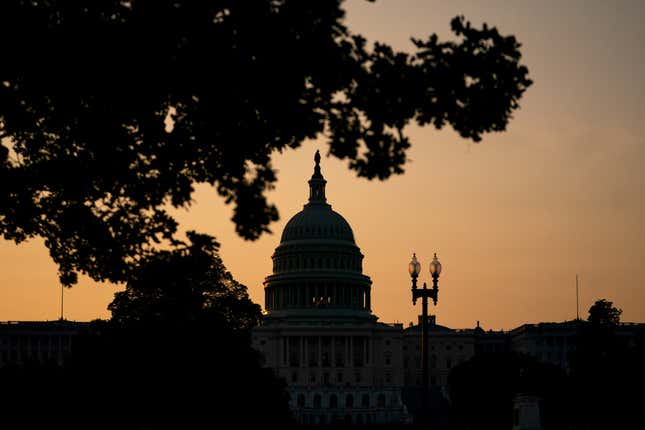
Good morning, Quartz readers!
Here’s what you need to know
Calling on a hire power. The ADP private jobs report showed growth that was below expectations, leading to President Donald Trump calling for an interest rate cut.
Statistically suspicious. The Bureau of Labor Statistics reportedly had to rely on educated guesses for its inflation numbers because of Trump’s DOGE-related hiring freeze.
Earnings show cents and sensibility. Dollar Tree is the latest company to send a signal that, amid increasing economic uncertainty, U.S. shoppers are hunting for bargains.
Still saving it for later. Fidelity data from the first quarter shows 401(k) balances are falling amid market uncertainty, but Americans are continuing to invest in increasing numbers.
Uncapped potential for Wells Fargo. The Fed just lifted the asset cap it imposed on the bank in 2018, giving the bank plenty of room to grow.
North Carolina: The AI of the storm. Amazon continues to pump money into the state, announcing plans to invest $10 billion in AI infrastructure spending for its AWS data centers.
Prompting a revenue stream. OpenAI has increased its paid user base by 50% in just three months — as three million users now pay for the company’s ChatGPT products.
Got Ives on the prize. Tech analyst Dan Ives — and Wedbush Securities, where he is the managing director — have launched an ETF that tracks AI stocks.
Tesla’s overseas EViction notice? The automaker had a rough May — with sales down significantly across Europe, including a 45% year-over-year decline in the U.K.
The Trump family’s coin of silence. The president’s sons have denied any involvement in a Trump-branded crypto wallet launch.
Layoffs by line item
In 2023, Microsoft cut 10,000 employees. Alphabet followed with 12,000. Meta launched its “Year of Efficiency.” Industry analysts blamed over-hiring and AI disruption, but buried in corporate filings was another, less visible culprit: a delayed change to Section 174 of the U.S. tax code.
Until 2022, companies could fully deduct their research and development costs — from engineer salaries to internal software tools — in the year they were incurred. That incentive shaped Silicon Valley, encouraging companies to build in the U.S. and invest heavily in product development.
But a provision buried in the 2017 Trump tax law quietly rewrote those rules. To make the bill appear “deficit neutral” on paper, lawmakers delayed a change to Section 174: Beginning in 2022, firms would be required to amortize R&D costs over five or 15 years, dramatically altering the economics of in-house development.
The shift, described by insiders as a “niche issue with broad impact,” didn’t trigger headlines. But it did trigger layoffs — and not just in Big Tech. From direct-to-consumer startups to crypto platforms, companies that once relied on immediate R&D deductions suddenly faced real tax bills on paper profits. Entire teams vanished. And an economy built on rapid, software-driven innovation saw its growth model undermined by a single accounting change.
Congress is now weighing a bipartisan rollback. But for the more than 500,000 tech workers who were already laid off — and for a sector that once generated 20% of U.S. GDP — the damage may be more than fiscal. Quartz’s Catherine Baab has more on the tax tweak that has become a layoff accelerator.
Elon Musk’s power surge
White House staple (and Tesla CEO) Elon Musk has launched a public campaign against the cornerstone of Trump’s second-term policy agenda — a “big, beautiful” tax bill — calling on Republicans to scrap the party’s domestic “megabill” and start over.
In a string of posts on X, Musk has denounced the legislation as “a disgusting abomination” and warned it would “bankrupt America.” He urged followers to contact their representatives, accompanied by an image from “Kill Bill” and an all-caps directive: “KILL the BILL.”
Republican lawmakers appear unmoved. One senior GOP aide told Quartz that the fact that Trump is staying the course indicates that the party will hold the line. Privately, some suggest Musk’s opposition has less to do with deficit concerns and more with the bill’s scrapping of EV subsidies that directly benefit Tesla.
Democrats are leaning into the political absurdity. Senate Minority Leader Chuck Schumer on Wednesday referred to the proposal by a new name: the “Well, We Are All Going to Die Act,” referencing GOP Sen. Joni Ernst’s recent defense of Medicaid cuts.
But whether Musk’s crusade is rooted in fiscal hawkishness or strategic self-interest, his comments add yet another complication to a bill that Trump wants on his desk by July 4. Quartz’s Joseph Zeballos-Roig has more on Musk’s high-voltage opposition.
More from Quartz
✈️ FAA says it isn’t considering removing a production cap on 737 MAX planes
🇺🇸 These are the states with the best — and worst — economies at the moment
😰 Jensen Huang’s biographer says the CEO is motivated by “fear and guilt”
💸 How stock-based pay became the ultimate workplace perk
🍅 Tomatoes, beef, and more are among this week’s recalled foods
Our best wishes on a safe start to the day. Send any news, comments, and more to [email protected].